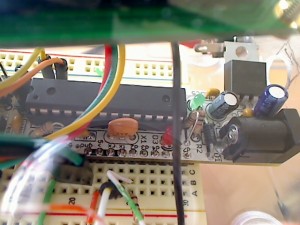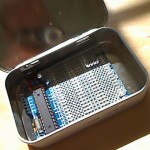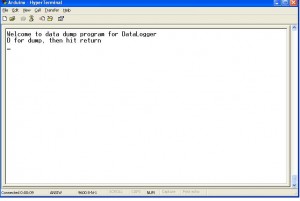Freeduino USB complete KIT - build yourself with USB pre-soldered $23
Write to SD card http://www.arduino.cc/cgi-bin/yabb2/YaBB.pl?num=1206874649/8
Thursday, December 17, 2009
Arduino on a breadboard with a serial connection
 Connections to the PC for uploading requires either a serial connection (getting rarer!), or a USB (best). But all USB on an arduino makes the basic board expensive. This is only an issue if you continually have to connect to the board, such as in a dataLogger - where it might be best to use a USB port for convienience.
Connections to the PC for uploading requires either a serial connection (getting rarer!), or a USB (best). But all USB on an arduino makes the basic board expensive. This is only an issue if you continually have to connect to the board, such as in a dataLogger - where it might be best to use a USB port for convienience.For boards built around a breadboard, or to use a serial connector, from arduino site, or good tutorial using the 7404 chip,
Monday, December 14, 2009
Saturday, December 12, 2009
Hardcopy arduino fits in altoids tin
PCB with attached arduino, known as hardcopy, allows completed project within footprint of altoids tin - sounds great.

Only issue, is that the RESET pin is not brought out. BUT, there is a RESET in the ICSP header, so could utilize that one I think

Only issue, is that the RESET pin is not brought out. BUT, there is a RESET in the ICSP header, so could utilize that one I think
Wednesday, December 9, 2009
Arduino - Printing floats to specific decmimal places
Reading temperature values and then printing is problematic if only 1 dec. pl. need. So use the print print float function or else look at forum post
DataLogger Version 1
Version 1 logs temperature from LM34 to external EEPROM and an LCD. Then use Hyperterminal to download data

Tuesday, December 8, 2009
External EEPROM - writing temperature data
Having negative numbers and also floats, writing bytes to external EEPROM is problematic. An excellent thread on LSB and MSB splits is really helpful
Monday, December 7, 2009
I2C on arduino
Having got the EEPROMs to work on I2C using the TWI libraries, time to move to some other I2C chips. A blog on interfacing entitled I2C expanision is helpful,using Texas Instruments PCA9535 and PCA9555 16-bit I/O port expanders.
Wednesday, December 2, 2009
Serial out
Tigoe has excellent tutorial on serial out, and read into processing. A must do!

and an awesome serial out to processing and radar screen. Should work for Hospital monitor!


and an awesome serial out to processing and radar screen. Should work for Hospital monitor!

Open source arduino clock
Faludi posted a great open source clock
Tuesday, December 1, 2009
Lego arduino clock
Great post on an arduino clock , set time by accelerometer.
, set time by accelerometer.
 , set time by accelerometer.
, set time by accelerometer.
Arduino watchdog and sleep functions

Make use of the Watchdog and Sleep functions provided by the ATMEGA 168 chip . These functions are useful if you want to build low power consuming devices operated by battery or solar power
Subscribe to:
Posts (Atom)
